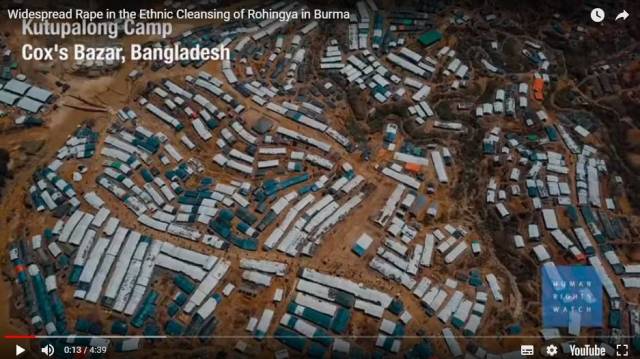 Human Rights Watch has compiled video evidence of the treatment of the Rohingya people and their life in camps in Bangladesh [Human Rights Watch video].
Human Rights Watch has compiled video evidence of the treatment of the Rohingya people and their life in camps in Bangladesh [Human Rights Watch video].
Bangladesh and Myanmar agreed in November to begin repatriating refugees within two months, as global pressure intensified over a crisis that has forced some 620,000 Rohingya to flee across the border.
Referring in unusually strong language to the military’s ‘horrendous atrocities’ in Myanmar, the US secretary of state, Rex Tillerson, said: ‘It is clear that the situation in northern Rakhine state constitutes ethnic cleansing against the Rohingya.’ However, as Foreign Policy noted, the US did not go beyond condemning events.
While the violence had largely stopped, Reuters reported, Rohingya were continuing to stream to Bangladesh, saying they had largely lost their homes and livelihoods. According to evidence compiled by Human Rights Watch, the mass rape of women and girls appeared to have been used as a weapon of war. Even if she remains hugely popular in her own country, the reputation of Aung San Suu Kyi, the once-lauded Nobel peace prize-winning opposition figurehead who became de facto leader of Myanmar, will never recover internationally after details of massacres emerged, such as the mass killings at Tula Toli in the Guardian, or accounts of Rohingya women and girls forced into prostitution as refugees in Bangladesh from the BBC.
Rohingya waiting in the squalid camps over the border in Cox’s Bazaar were unimpressed by the deal, which did not say how many refugees would be allowed to return and followed a formula agreed in a repatriation agreement between the two nations after previous violence in 1992. Under this accord, Rohingya had to present residency documents, which very few have, before being allowed to return. One man told Al-Jazeera: ‘If we are not given citizenship, I would die rather than go back.’ As the Washington Post reported, the Rohingya’s doubts about the agreement were not helped by a statement from Suu Kyi that avoided using the term ‘Rohingya’. Sayed Alom, from Hoyakong, said: ‘I need to know if they are going to accept us with the Rohingya identity.’
Bangladesh might be living with the huge burden of so many refugees for some time, though it could cost $1bn a year – or 70% of the country’s income per capita, the Dhaka Tribune reported. The Myanmar regime’s siege mentality has led to it claiming that international aid workers were helping Muslim ‘terrorists’, so may be reluctant to abide by its agreement, while many of the refugees it had created felt they had no home there any longer. ‘I will not go back to Myanmar,’ one woman said. ‘Even if they have to kill me here in Bangladesh.’



